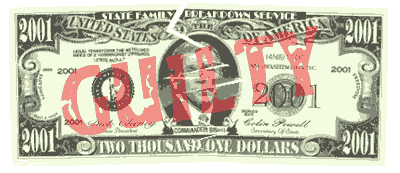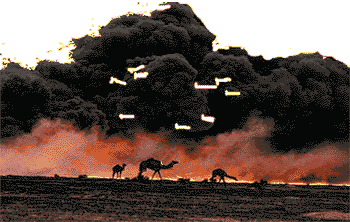|
from 21 september 2003 blue vol II, #97 |
|
|
Chaos, Collapse and Survival 
by Jan Lundberg
Up until recent years, the illusion of equitable economic growth and perpetual material security were enough to calm people in their struggles, provided they were not directly oppressed or persecuted. However, when top executives now make 450 times minimum wage, when extra billions of dollars are always squandered on the gold-plated U.S. military as opposed to helping working people who pay taxes, and when the environment is deliberately trashed for financial gain, this sends everyone a message louder and louder: "It's dog eat dog, and to hell with future generations." What the establishment counts on is most people accepting this and being good consumers. However, some of us resist, and when it's together with like-minded people it creates an alternative we can call community. U.S. flag wavers don't like to think they're sending future generations to hell. After all, with faith in good ol' 'merican ingenuity, everything will just keep getting rosier, right? But they need to wake up and smell our smoke from Iraq and our climate-altering vehicles. That would imply eventually changing - perish the thought - one's daily routine and social relations. There are some interesting reasons to think and act, such as ensuring there's a future food supply in the petroleum-mainlining economy. Another consideration is that U.S. population has sailed past sustainability, mostly by importing 1.2 million new workers legally and permanently each year. Legal immigration constitutes the biggest factor in the disastrous growth of the nation's population. This is policy mainly meant to add to the consumer base and lower wages. Many commentators focus passionately and accurately on the issue of social equity or on the plight of the ecosystem. While these absolutely merit immediate action, it is vital to also look beyond issues, to anticipate where we will arrive and how to cope when we get there. Scenarios for collapse A banking crisis means that a bank fails to pay its lenders/depositors, which spreads to other banks. Some measures stanch this "problem" (can it be a blessing in disguise?), but cannot when the contradictions of a false economy are too strong. A whole country can default, as has happened before. It spreads to other countries, as in the early 1930s from Europe to the U.S. Related to this kind of financial melt-down is stock market crash. The financial system depends on endless growth and massive debt. Moreover, these conditions occur in the finite, fragile ecosystem which has for many decades been unable to provide subsistence for everyone without unlimited petroleum inputs. So, the global corporate schemes personified by the World Trade Organization, the World Bank and other entities exist to maximize growth and profits in ever new ways (trade tribunals, etc.). This turns the whole planet into a supermarket owned by the few; even water is becoming a commodity. What was a world of private property coexisting with civil society - potentially to allow reforms - is rapidly becoming less open. Certainly less fun, it is increasingly guarded by militarized police and more laws. Those who aren't part of the "only game in town" - consuming lavishly - aren't wanted around, and they generally suffer. At least the dispossessed (huh? aren't they just lazy?) aren't suffering delusions of being better than others (poor people). More and more people are contemplating the direction of society in terms of acknowledging scenarios of chaos, collapse and survival. The myth of government protection for all citizens is becoming more clear, as private self-interest has corrupted more extensively than ever. The White House can be re-christened the Black House, for its representation of oil interests and their "black gold." Government merely props up the status quo; it always has and always will, including revolutionary governments. So, we will not see official leadership towards issues of collapse and survival. Denial is the byword, locally on up through national and international bodies. For leaders to bring up collapse and survival would be too "unpleasant," like reminding people that today's fast food is not food, or that the U.S. was founded on (among other things) genocide, slavery and exploitation of nature.  The end of oil
A final energy crisis is on tap to end this extended, gluttonous feast on the Earth's limited, dwindling resources. The weakest link in the critical chain of the globalized economy is sufficient, cheap oil. With world oil extraction peaking now, the market is a disaster waiting to happen. We saw this in the 1970s, when oil production was still climbing and demand was lower. Those factors are not in our favor today, so we will pay for putting off having an intelligent energy policy. Now, U.S. gasoline demand, for example, has shot up 30% over the 1970s, and it will not be possible to comfortably cut back, or bite the bullet and make due. This is because there is no mechanism in place for drastic conservation, and alternative fuels are by no means ready for the level of use the present economy's size would want. Some people, however, are ready for serious conservation, enduring the ridicule of flag-waving consumers.
The imminent perceptible gap between supply and demand for oil will trigger an overnight scramble for supplies before prices skyrocket. This shortage will not be abated, when the world's geology is patently insufficient for endless growth in demand. This means that when the trucks cannot make the supermarket deliveries, the whole game is up. Panic and chaos ensue. It'll be a little late to depave the driveway and plant a garden or turn the lawn into an orchard. But, better late than never.
Die-off is inevitable, because humans have exceeded their carrying capacity (an ecological measurement): about one billion people is the Earth's limit, perhaps. It is true that present factory-farm agriculture based on animals is wasteful, but most of the crop production we'd like to see instead is also completely dependent on petroleum (natural gas and oil). We are, as the book by Maurice Green is titled, "Eating Oil." Worse, we have no more Garden to return to, thanks to greed and growth. (The original Garden of Eden was probably napalmed recently by the U.S. in Mesopotamia.)
While we can say "good riddance" to the entire wasteful system of loving artificial wealth, there remain severe environmental concerns that long-term survival will hinge on. Dealing with nuclear waste/weaponry will be the challenge for hundreds of generations to come. Of a shorter-term nature, many toxic inventories - most from petrochemical production - need neutralizing.
Individual response
Chaos is still building, culminating soon in the overall failure of dominant "artificial society." Artificial society is the anti-nature, materialist principles and structures that have become increasingly technical as we have been "evolving." Bureaucracies, along with factories making millions of non-biodegradable objects of short-lived utility, may all dissolve like sand castles in a socio-ecological tsunami that is being created this moment. There has been a build-up of seven decades since the last "economic correction." That Great Depression will be fondly remembered compared to the Great Leveler, as we may call the coming tsunami of collapse.
Many of us are not even prepared to entertain the idea of living with few consumer appliances, let alone commence a low-tech, subsistence way of living. Preferred scenarios and even social movements will matter little when prime directives are in a frenzied motion: secure food and water that is clean, defend home/community territory, and replace unworkable social customs in order to organize effectively. Compassion will have to elbow its way in if there is to be long-term success.
Another positive side of anticipating chaos and the aftermath is to live the adventure of life outside the deceptively comfortable box of the modern home. To feel like a warrior watching for the first sign of the tsunami, or walking (or bicycling) the Earth in a War of Love, can provide mutual support and have solitary rewards as well.
Meanwhile, many an activist today puts primary energy into fighting sexism, racism and corporate excess. These are excellent to fight against, in part because today's unsustainable economy grew out of patriarchal, hierarchical violence. Building a new society that will last has to dispense with unnecessary, unjust conventions prevailing today. However, looking ahead to the crushing, painful demise of Petroleum Civilization, the priorities seem to be mainly (not necessarily in this order):
The end of oil
A final energy crisis is on tap to end this extended, gluttonous feast on the Earth's limited, dwindling resources. The weakest link in the critical chain of the globalized economy is sufficient, cheap oil. With world oil extraction peaking now, the market is a disaster waiting to happen. We saw this in the 1970s, when oil production was still climbing and demand was lower. Those factors are not in our favor today, so we will pay for putting off having an intelligent energy policy. Now, U.S. gasoline demand, for example, has shot up 30% over the 1970s, and it will not be possible to comfortably cut back, or bite the bullet and make due. This is because there is no mechanism in place for drastic conservation, and alternative fuels are by no means ready for the level of use the present economy's size would want. Some people, however, are ready for serious conservation, enduring the ridicule of flag-waving consumers.
The imminent perceptible gap between supply and demand for oil will trigger an overnight scramble for supplies before prices skyrocket. This shortage will not be abated, when the world's geology is patently insufficient for endless growth in demand. This means that when the trucks cannot make the supermarket deliveries, the whole game is up. Panic and chaos ensue. It'll be a little late to depave the driveway and plant a garden or turn the lawn into an orchard. But, better late than never.
Die-off is inevitable, because humans have exceeded their carrying capacity (an ecological measurement): about one billion people is the Earth's limit, perhaps. It is true that present factory-farm agriculture based on animals is wasteful, but most of the crop production we'd like to see instead is also completely dependent on petroleum (natural gas and oil). We are, as the book by Maurice Green is titled, "Eating Oil." Worse, we have no more Garden to return to, thanks to greed and growth. (The original Garden of Eden was probably napalmed recently by the U.S. in Mesopotamia.)
While we can say "good riddance" to the entire wasteful system of loving artificial wealth, there remain severe environmental concerns that long-term survival will hinge on. Dealing with nuclear waste/weaponry will be the challenge for hundreds of generations to come. Of a shorter-term nature, many toxic inventories - most from petrochemical production - need neutralizing.
Individual response
Chaos is still building, culminating soon in the overall failure of dominant "artificial society." Artificial society is the anti-nature, materialist principles and structures that have become increasingly technical as we have been "evolving." Bureaucracies, along with factories making millions of non-biodegradable objects of short-lived utility, may all dissolve like sand castles in a socio-ecological tsunami that is being created this moment. There has been a build-up of seven decades since the last "economic correction." That Great Depression will be fondly remembered compared to the Great Leveler, as we may call the coming tsunami of collapse.
Many of us are not even prepared to entertain the idea of living with few consumer appliances, let alone commence a low-tech, subsistence way of living. Preferred scenarios and even social movements will matter little when prime directives are in a frenzied motion: secure food and water that is clean, defend home/community territory, and replace unworkable social customs in order to organize effectively. Compassion will have to elbow its way in if there is to be long-term success.
Another positive side of anticipating chaos and the aftermath is to live the adventure of life outside the deceptively comfortable box of the modern home. To feel like a warrior watching for the first sign of the tsunami, or walking (or bicycling) the Earth in a War of Love, can provide mutual support and have solitary rewards as well.
Meanwhile, many an activist today puts primary energy into fighting sexism, racism and corporate excess. These are excellent to fight against, in part because today's unsustainable economy grew out of patriarchal, hierarchical violence. Building a new society that will last has to dispense with unnecessary, unjust conventions prevailing today. However, looking ahead to the crushing, painful demise of Petroleum Civilization, the priorities seem to be mainly (not necessarily in this order):
 "Share the land", as the Guess Who song from 1970 went.
Birth of a new culture
Although cultural diversity has been greatly stamped out by the dominant culture since the Agricultural Revolution - witness the disappearance of countless languages - the collapse to come may mean a fusion of cultures.
In the U.S., the existing dominant culture will not suddenly die out 100%. The two cultural traditions - materialism/growth, and nature-based - can become one neotraditional nature culture. Some technological and individualistic "traditions" from mainstream U.S. culture, such as redneck culture, will linger for a while. Its behaviorisms and attitudes will fade, as time goes on.
Formal education, once offering degrees and separation from other segments of the population, will revert to village/bioregional wisdom and skills. Who knows how many computers there will be. (Hopefully not many, when we consider entropy and the fact that Silicon Valley has the most Superfund toxic sites.) Our big brains need to again hold thousands of names for plants and animals - assuming there are still a lot of them left due to our massive "extincting." An oral tradition will resume almost universal dominance, when we can no longer waste millions of books and papers that wear out. Sustainability must be thought of in terms on not seven but 700 and 7,000 generations. The choice is ours today.
"Share the land", as the Guess Who song from 1970 went.
Birth of a new culture
Although cultural diversity has been greatly stamped out by the dominant culture since the Agricultural Revolution - witness the disappearance of countless languages - the collapse to come may mean a fusion of cultures.
In the U.S., the existing dominant culture will not suddenly die out 100%. The two cultural traditions - materialism/growth, and nature-based - can become one neotraditional nature culture. Some technological and individualistic "traditions" from mainstream U.S. culture, such as redneck culture, will linger for a while. Its behaviorisms and attitudes will fade, as time goes on.
Formal education, once offering degrees and separation from other segments of the population, will revert to village/bioregional wisdom and skills. Who knows how many computers there will be. (Hopefully not many, when we consider entropy and the fact that Silicon Valley has the most Superfund toxic sites.) Our big brains need to again hold thousands of names for plants and animals - assuming there are still a lot of them left due to our massive "extincting." An oral tradition will resume almost universal dominance, when we can no longer waste millions of books and papers that wear out. Sustainability must be thought of in terms on not seven but 700 and 7,000 generations. The choice is ours today.
- A prior Culture Change Letter, The Nature Revolution, a short story, acts out this topic of Chaos, Collapse and Survival. - For a sensitive political analysis suggesting a near-future outcome of U.S. oil aggression, enjoy this story by Adam Trombly - On the Beach.... Culture Change and SEI: P.O. Box 4347 Arcata California 95518 USA E-mail: info@culturechange.org Website: www.CultureChange.org Published by Sustainable Energy Institute, a nonprofit charity 501(c)(3) California corporation. Useful link: dieoff.com
|
||
| BLUE is looking for short fiction, extracts of novels, poetry, lyrics, polemics, opinions, eyewitness accounts, reportage, features, information and arts in any form relating to eco cultural- social- spiritual issues, events and activites (creative and political). Send to Newsdesk. |
